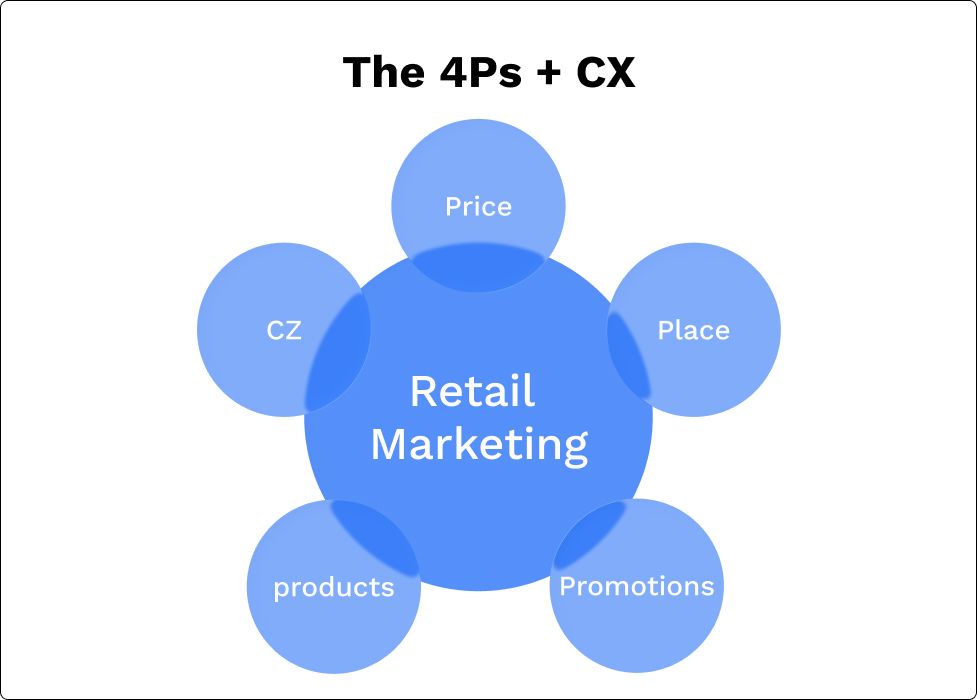Retail Marketing
15 Impactful Strategies of Retail Marketing for Business Growth
Tue, 24 Sep 2024 05:41:55 GMT
Speak to our Hyperlocal Expert

Editor’s Note: This post was originally published in Sep 2024 and was updated in Oct 2025 for accuracy and comprehensiveness.
A retail marketing strategy comprises plans and tactics to promote products, attract customers, and drive sales both in-store and online. It includes market research, branding, advertising, and promotions tailored to meet consumer needs and business goals.
The objective of retail marketing strategies is to establish a robust competitive edge, foster brand recognition, cultivate customer loyalty, and ultimately drive business expansion.
By understanding consumer behaviour, identifying target markets, and implementing effective tactics, retailers can optimise their marketing efforts and position themselves for success in the highly competitive retail industry.
Come along as we explore what is retail marketing strategy, uncovering the potential of these influential strategies to transform your business and unleash its maximum capabilities.
What is a Retail Marketing Strategy?

A retail marketing strategy is a comprehensive plan that retail businesses create and execute to promote their products or services, attract customers, and drive sales. In simple terms, it defines how a retailer connects with the right audience, where they position their products, and what actions they take to stand out in a competitive market.
At its core, strategic retail management brings together both traditional methods (such as in-store displays, print ads, and events) and digital approaches (like social media marketing, SEO, and email campaigns) to create a unified customer experience across all touchpoints.
A strong retail marketing strategy also relies on the retail marketing mix - the 4Ps: Product, Price, Place, and Promotion. Together, these elements guide how a brand presents its offerings, sets competitive prices, reaches customers, and communicates value.
In 2025, evolving consumer behaviour, rapid digital transformation, and the rise of omnichannel retail make having a clear retail marketing strategy more important than ever. Retailers who combine data-driven insights with personalized engagement can build stronger connections, enhance brand loyalty, and stay ahead of shifting market trends.
Why Is Retail Marketing Strategy Crucial for Your Business

Strategies of retail marketing are essential for your business. In a competitive marketplace, it provides a clear roadmap for marketing your products and reaching your target audience. Gaining insight into the needs and preferences of customers makes it simpler to attract and retain their loyalty.
Secondly, a well-defined retail marketing strategy enables you to optimise your resources and budget by identifying the most effective marketing channels and tactics. This ensures that you allocate your resources strategically, maximising return on investment.
In addition, a retail marketing strategy helps your business grow and succeed by setting clear goals. It contributes to long-term success by aligning marketing activities with business goals. Furthermore, it assists you in adapting to changing market conditions and consumer trends.
Types of Retail Marketing
In strategic retail management, businesses use various types of retail marketing to connect with customers through both physical and digital touchpoints. Each type focuses on unique ways to promote products, enhance visibility, and drive conversions.
1. In-Store Marketing
This traditional form of retail marketing focuses on influencing customer behavior within the store. Retailers use visual merchandising, product placement, and in-store promotions to enhance the shopping experience and boost impulse purchases.
2. Digital or Online Retail Marketing
A key part of modern retail marketing strategy, digital marketing includes social media campaigns, SEO, email marketing, and paid ads. It helps retailers reach wider audiences and personalize customer interactions online.
3. Omnichannel Retail Marketing
This approach combines both online and offline experiences to deliver seamless customer journeys. It reflects advanced strategic retail management, ensuring consistent communication and fulfillment across websites, stores, apps, and marketplaces.
4. Direct Marketing
Direct marketing involves personalized communication through SMS, emails, or loyalty programs. It allows retailers to engage directly with customers, promote offers, and strengthen brand loyalty.
5. Influencer and Social Commerce Marketing
Retailers collaborate with influencers and creators to promote products on social platforms. This type of retail marketing builds trust and authenticity, driving discovery and conversions through relatable brand storytelling.
Core Components of a Retail Marketing Strategy (The 4Ps + CX)

A successful retail brand marketing strategy is built on a well-balanced mix of the 4Ps: Product, Price, Place, and Promotion, along with a fifth and equally vital element, People or Customer Experience (CX). Together, these pillars form the foundation of strategic retail management, ensuring consistent brand value and customer satisfaction across every touchpoint.
1. Product – Assortment & Differentiation
Your product lineup should reflect customer preferences and market trends. Offering the right mix of products with unique features or value propositions helps differentiate your brand and strengthen its retail positioning.
2. Price – Competitive, Value-Based, & Promotional
Pricing should align with both perceived value and market competition. A strategic retail pricing approach can include discounts, bundles, and loyalty-based offers that attract new shoppers while retaining existing ones.
3. Place – Omnichannel Presence (Online + Offline)
Modern strategic retail management demands accessibility everywhere your customer shops. Integrating physical stores with online platforms ensures seamless discovery, availability, and fulfillment, which is the essence of a strong omnichannel retail brand marketing strategy.
4. Promotion – Advertising, Loyalty Programs & Events
Promotional efforts tie your retail story together. From digital ads and influencer collaborations to loyalty programs and community events, effective promotions enhance brand visibility and engagement across all channels.
5. People / Customer Experience (CX)
The fifth “P” focuses on the human side of retail. Your employees, service quality, and customer interactions directly shape the retail brand experience. Prioritizing customer satisfaction through personalization, support, and post-purchase engagement drives long-term loyalty and advocacy.
Retail Marketing Strategies for Your Business
Basis | Retail Brand Marketing Strategy | Retail Marketing Strategy |
Focus | Building brand identity, storytelling, and emotional connection | Driving sales, customer engagement, and short-term conversions |
Time Horizon | Long-term and sustainability-focused | Short-term and campaign-driven |
Objective | Establish trust, loyalty, and brand recognition | Generate immediate traffic, leads, and sales |
Example | Consistent visual branding, tone, and brand story across all channels | Flash sales, festive promotions, and event-based marketing |
Both strategies complement each other within strategic retail management. While a retail brand marketing strategy builds a strong and recognizable identity that customers can relate to, the retail marketing strategy activates that brand through targeted campaigns and offers. When combined, they create a powerful balance between brand trust and business growth, helping retailers attract, engage, and retain customers effectively in a competitive marketplace.
Framing Your Retail Marketing Strategy

Creating a strong retail marketing strategy starts with understanding your audience and aligning every marketing effort toward measurable business growth. The first step is to analyze your target customers, their preferences, buying behavior, and local market dynamics. This insight forms the base of strategic retail management, helping you position your brand effectively in a competitive landscape.
Next, study market trends and competitors to identify opportunities and gaps. Set clear marketing objectives and goals that define what success looks like for your retail business, whether it’s increasing store footfall, boosting online sales, or enhancing customer retention. Choose the most effective marketing channels, both online and offline, to ensure consistent visibility across all touchpoints.
Your messaging and branding should communicate a strong value proposition that resonates with customers. Support this with promotions, offers, and personalized engagement tactics to attract and retain loyal shoppers. Finally, monitor performance and gather feedback to assess what’s working. Continuously optimize your retail brand marketing strategy based on data-driven insights to ensure sustainable growth and adaptability in changing market conditions.
Before we dive into 15 Impactful strategies of Retail Marketing for businesses, Watch this quick video for a better understanding.
Top 15 Retail Marketing Strategies for 2025
Here are a few impactful strategies of retail marketing, including strategic retail management, to empower your business in 2025 :
#1 Best Retail Marketing Strategy - Utilise Location-Based Marketing
Location-based marketing, is a key aspect of a retail brand marketing strategy, enabling the delivery of personalised messages based on geographical location. By leveraging location data, marketers can effectively target individuals in proximity to stores or local events. This approach not only engages and retains customers but also allows for precise targeting of specific segments through tailored offers. The ultimate goal is to enhance the customer experience, particularly for an instant-gratification-oriented population, by providing relevant and timely messaging based on their location.
Enhance your understanding with this informative video.
#2 Retail Marketing Strategy - Optimise Your Online Store for Mobile
Having a great online store is not sufficient; it is equally important to have a mobile-friendly website. A mobile-friendly site not only improves your SEO rankings but also boosts sales for your business, regardless of the holiday season. Here are some guidelines to help you make sure your mobile-friendly e-commerce site is secure.
– Ensure fast loading times for your webpage
– Include obvious prompts for action
– Enhance user experience through optimization
– Simplify the checkout process
– Incorporate social media integration into your e-commerce site.
#3 Retail Marketing Strategy - Personalization of websites to provide convenience
Website personalization delivers custom experiences based on visitor preferences. Utilising analytics and segmentation, marketers tailor each user’s experience. With abundant information, personalization is valuable, ensuring visitors see relevant content, enhancing convenience. Today, businesses effectively engage their target market through website personalization, capturing attention. Customization fosters audience comfort, increasing time spent on your site.
#4 Retail Marketing Strategy - Make the Appropriate Pricing Strategy
A pricing strategy finds the best price considering demand and market conditions to maximise profits. Factors like revenue goals, target audience, brand positioning, and product attributes shape pricing strategies. External factors such as competitor pricing and market trends influence pricing decisions. Sekel Tech’s pricing models and retail marketing strategies provide insights to determine the right price for your audience and achieve revenue goals.
#5 Retail Marketing Strategy - Maximise Your Google Presence with Smart Listing Management
Promoting your business on Google is essential for any successful retail marketing strategy, and Sekel Tech’s Dynamic Listing Management takes it to the next level. By centralizing control of your online listings, especially your Google Business Profile (GBP), Sekel helps you manage, update, and optimize store details in real time - whether you operate 10 or 10,000 stores. With features like STP automation, competitor analysis, GMB Protect, review link generation, and mobile dashboard access, businesses can maintain active, accurate listings that rank higher and convert faster. In today’s hyperlocal world, visibility and engagement on Google directly impact foot traffic and sales. Stay ahead in the digital landscape by integrating Sekel Tech’s intelligent listing management to maximize your business potential and turn local searches into store visits.
To know more about how you can make use of Google & Google My Business, watch this video on “GMB Listings & Microsites”
#6 Retail Marketing Strategy - Understand Your Customers Well
Understanding your customers is crucial for generating more leads and growing your business. By gaining insights into their preferences, you can provide excellent service, fostering strong customer relationships and generating new sales through positive word-of-mouth. However, comprehending your customers’ psyche can be challenging. To anticipate their needs and surpass their expectations, analysing their purchase patterns and preferences is essential.
#7 Retail Marketing Strategy - Engaging Customers Across Multiple Channels Simultaneously
Companies face the challenge of efficiently managing the customer lifecycle to provide personalised experiences within a single journey, while also synchronising multiple channels. Omnichannel customer engagement is essential for businesses dealing with disjointed interactions. By adopting best practices and solutions for omnichannel customer engagement, companies can ensure consistent and personalised customer experiences across all channels and touchpoints.
#8 Retail Marketing Strategy - Develop an Effective Store Locator
A store locator is a vital tool for consumers to find the nearest physical locations on a merchant’s website. It provides contact information, business hours, and other details on a dynamic map. Beyond stores, it can also display other information. Using a store locator is crucial for making informed decisions before visiting a store and making a purchase. It is the key step in attracting potential clients.
Read Also - Dynamic Hyperlocal Store Locator: Advanced Features in 2025
#9 Retail Marketing Strategy - Digital Product Catalogue
Brands use catalogue management software to keep their product catalogues updated with the latest releases. Buyers rely on product catalogues to gather important details about a product, spending time researching to make informed purchase decisions. These catalogues ensure buyers can access current and relevant product information. No matter the goods being purchased a burger, a pair of shoes, or a living room sofa buyers want to clearly grasp their options in today’s market, making a product catalogue crucial for shops.
Read Also - Product Catalogue Management: Top 10 Examples in 2025
#10 Retail Marketing Strategy - Social Media Influencer Partnerships
Leverage the power of social media influencers to expand your brand reach and attract new customers. Collaborate with influencers who align with your target audience to promote your products or services, driving brand awareness and engagement.
#11 Retail Marketing Strategy - Interactive In-Store Experiences
Create immersive and interactive experiences within your physical stores to captivate customers and encourage longer dwell times. Use technologies like augmented reality, virtual try-ons, or interactive displays to enhance the overall shopping journey.
#12 Retail Marketing Strategy - Loyalty Apps and Reward Programs
Develop a dedicated loyalty app or integrate reward programs into your mobile app to incentivize repeat purchases and foster customer loyalty. Offer exclusive perks, discounts, and personalised rewards to keep customers coming back for more.
#13 Retail Marketing Strategy - User-Generated Content Campaigns
Encourage customers to create and share content related to your brand or products on social media. Content Optimization can build trust, authenticity, and brand advocacy, attracting new customers through organic word-of-mouth.
#14 Retail Marketing Strategy - Sustainable and Ethical Branding
Embrace sustainability and ethical practices in your branding to resonate with environmentally-conscious consumers. Highlight eco-friendly initiatives, responsible sourcing, and social impact efforts to build a strong connection with socially-conscious customers.
#15 Retail Marketing Strategy - AI Chatbots for Smarter Customer Support
Implementing AI-powered chatbots is a key retail marketing strategy for 2025, and Sekel Tech’s AI Chatbot makes it smarter, faster, and more retail-focused. Designed exclusively for retailers, the Sekel AI Chatbot engages customers across your website, WhatsApp, Messenger, and social channels using only verified brand data, ensuring accurate answers, consistent tone, and complete brand safety. From handling service inquiries and product questions to promoting offers and managing returns, it delivers round-the-clock support that enhances satisfaction and builds trust. With no-code customization, multilingual support, and deep retail analytics, businesses can personalize engagement, streamline customer service, and uncover high-conversion opportunities. Sekel Tech’s AI Chatbot empowers brands to engage smarter, convert faster, and deliver seamless customer experiences that drive long-term loyalty and growth.
Sekel Tech excels in implementing the above strategies of retail marketing, driving business growth for its clients.
Key Takeaways from Retail Marketing
1. Know your audience
Understanding your target audience and their buying behavior is the foundation of every successful retail marketing strategy.
2. Adopt an omnichannel approach
Embrace strategic retail management to connect with customers across online and offline touchpoints for a seamless shopping experience.
3. Focus on personalization
Tailor offers, content, and communication to individual preferences, a key aspect of an effective retail brand marketing strategy.
4. Use data-driven insights
Leverage real-time sales conversion analytics to evaluate performance, track customer journeys, and optimize your retail marketing campaigns for maximum ROI.
5. Build long-term relationships
Foster loyalty through personalized experiences, exceptional service, and well-structured reward programs that strengthen customer trust and retention.
For deeper insights into upcoming trends, you can also explore The Best Retail Marketing Strategies for 2025 by HT Media. It highlights emerging technologies, customer experience innovations, and key approaches shaping the future of retail marketing.
Frequently Asked Questions (FAQs)
1. What is strategic retail management?
Strategic retail management focuses on developing and executing a well-defined plan that guides a retailer’s long-term direction. It involves setting clear objectives, analyzing strengths and weaknesses, identifying growth opportunities, and creating actionable strategies to achieve business goals. This structured approach ensures that every decision aligns with the retailer’s mission and overall vision for success.
2. What are the 7 steps in the strategic retail planning process?
The seven essential steps in the strategic retail planning process include:
1. Defining the business mission and purpose.
2. Conducting a detailed SWOT analysis.
3. Identifying potential strategic opportunities.
4. Evaluating alternative strategies for growth.
5. Setting measurable objectives and allocating resources effectively.
6. Developing a retail mix to implement the chosen strategy.
7. Measuring performance and making necessary adjustments to improve outcomes.
3. How to measure retail marketing ROI?
To measure retail marketing ROI, compare the revenue earned from a marketing campaign to the total amount spent on it. The basic formula is:
ROI = (Sales Revenue – Marketing Costs) ÷ Marketing Costs × 100.
This helps determine how effectively your marketing investments are generating profits and guiding future budget decisions.
4. What is the concept of retail marketing?
Retail marketing is the practice of promoting and selling products or services directly to consumers through multiple distribution channels. It combines strategies like advertising, promotions, partnerships, public relations, and digital marketing to attract customers, increase engagement, and drive sales.
5. What are the 7 Factors of Strategic Retail Management?
The 7 Factors of Strategic Retail Management encompass location selection, merchandise assortment, pricing strategy, store layout and design, customer service, inventory management, and marketing and promotions. These elements collectively contribute to a successful retail operation by ensuring optimal product offerings, customer experience, and profitability.
Conclusion
In today’s fast-evolving retail landscape, success depends on how strategically you market, engage, and deliver. Implementing these 15 powerful retail marketing strategies can help you boost brand visibility, attract the right audience, and drive measurable growth. A well-structured Retail Marketing Strategy not only fuels sales but also builds lasting customer relationships and ensures your business stays ahead in an increasingly competitive marketplace.
Take Advantage of Sekel Tech’s Retail Marketing Strategy
Accelerate your growth with Sekel Tech’s data-driven Retail Marketing Strategy built for the future of retail. Powered by intelligent automation, hyperlocal discovery, and omnichannel engagement, Sekel Tech helps brands optimize visibility, manage customer journeys, and convert intent into action. From dynamic listings and AI chatbots to hyperlocal ads and analytics, every solution is designed to empower your retail brand marketing strategy and deliver real business impact.
Transform your retail presence. Partner with Sekel Tech today and turn discovery into conversion, customers into loyal advocates.
Share
Similar Blogs
Loved this content?
Sign up for our newsletter and get the latest tips & updates directly in your inbox.
There’s more where that came from!